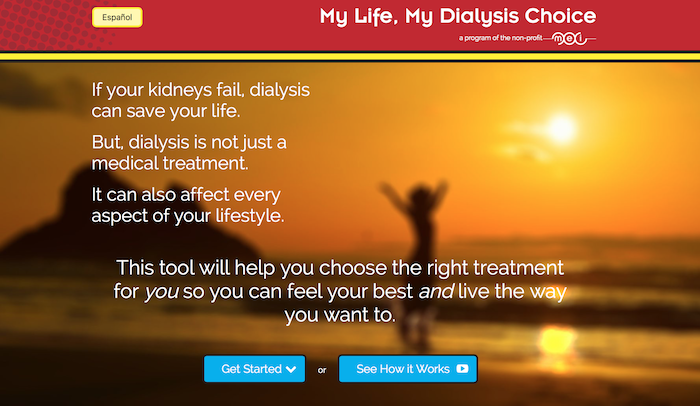Why to NOT Ask “Have You Thought About Home Dialysis?”

Something I hear over and over again among passionate home dialysis advocates is that they approach prospective PD or home HD candidates by asking, “Have you considered a home therapy?” Or, “You should do PD!” (I hear the same thing from dialyzors.) The problem with this approach—however well-meaning—is that it puts the modality first, as if the home treatment is a goal. But, it isn’t. Any modality is just a means to an end, not an end in and of itself.
As I’ve mentioned before, it took me a VERY long time of listening to dialyzors of every age, gender, and background to realize what now seems glaringly obvious: no-one wants any kind of dialysis. What they want is to turn back the clock, to take the pill that will cure their ailing kidneys, to have this not be happening. Wouldn’t you?
Denial, I strongly believe, is fueled by fear. Why don’t people get an access in plenty of time before they start treatment? Why do about half of American dialyzors each year crash into treatment emergently—even though many knew they had diabetes, hypertension, or both (what I call the “double whammy”? Fear. No one wants their lives to change in dramatic, scary ways. Instead, far too many wait, not believing the diagnosis and/or hoping it will go away, until the symptoms become too much to take and they end up in an emergency room needing a catheter. When we use a modality-first approach—“Which do you want, PD or HD?” for people who are scared, the answer is easy: Neither! Get me out of here! (I always picture the “See no evil, hear no evil, speak no evil monkeys.” Lalala, I can’t hear you!) As I pointed out in a previous post, fear makes learning impossible.
While denial is not a well-studied topic in nephrology, an interesting 2015 paper out of Poland (studies like these rarely seem to be done in the U.S.) compared coping strategies between 60 in-center HD and 55 PD patients. Not surprisingly, the in-center HD patients self-reported far higher levels of what the authors called “repressive coping strategies”—denial and avoidance—than the PD patients. 1 As in-center HD tends to be the default option used by people who don’t make an active modality choice, this makes sense.
What helps people get past denial and fear? Hope. And, what gives people hope? Keeping what matters most to them in their lives. THIS is why we need to avoid coming at people with modalities first. Instead, if we ask “What matters to you?”—and tailor our options education to meet their needs instead of offering standard, generic information, we put dialysis in the appropriate role: a means to a better chance of feeling better, maintaining a better quality of life, and even living longer.
The always-inspiring Lori Hartwell often says, “People don’t care how much you know until they know how much you care.” Asking people what matters to them and giving them information that fits their needs is a way to show that you care. And, you can easily do this using My Life, My Dialysis Choice. Try it!

- NowakZ, Wankowicz Z, Laudanski K.Denial defense mechanism in dialyzed patients.Med Sci Monitor.2015;21:1798-1805 ↩︎


Comments
Gale Schulke, RN
Jun 12, 2018 3:21 PM
We have a different approach these days. When someone comes into our Options program, we sit down with them and ask the big questions: What do you want from dialysis? Do you want to see a child get married? Do you want to travel? Do you want to finish school? How do you want dialysis to fit into your life? This generally leads to Home. Then we individualize the therapy to fit these goals. For example, if you are working, it isn't practical for you to do 4 manual exchanges during the day. If your job entails heavy lifting, then you might want to consider nocturnal HHD. If you are 82 years old, then day time exchanges may be the better mix for you. If you are newly married, then maybe we need to mix it up so you have the occasional night free. Humanizing dialysis is our Mission Statement and heavily supported by Dr. Schiller.
Dori
Jun 20, 2018 9:06 PM
Corlyn Altier
May 13, 2018 2:02 PM
Haley
Jul 26, 2018 4:06 PM
Peter Laird, MD
May 11, 2018 7:54 PM
Far too many patients live in denial and depression over their declining health despite the fact that we have excellent treatments for all of these conditions.
Sadly, these psycological issues follow them into the dialysis unit rendering them passively engaging in the choice of in-center hemodialysis.
Couple this with the fear of self cannulation and the increased work of self care, the cycle of helplessness and depression renders them into a rapidly dismal demise.
The cycle of depression and inaction is well studied in diabetes patients who comprise 45% of the ESRD population in the US.
https://www.diabetes.co.uk/diabetes-and-depression.html
Knowing all of this, I had not considered that the approach of informing patients of these home options may actually add further burdens of guilt and hopelessness to their depression.
Sadly, I have witnessed far too many exceedingly young people march down this path despite an entire team of medical professionals desperately trying to intervene.
I have yet to see anyone with the degree of success needed to abort this epidemic that only grows worse each year. Sadly, far too many are on dialyses that could have avoided or significantly delayed that outcome.
Dori Schatell
May 11, 2018 9:43 PM
Dori Schatell
May 11, 2018 6:53 PM
Rebecca F
May 11, 2018 4:52 PM